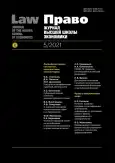Towards the Issue of Digitalization of Judicial Activities
- Авторлар: Stepanov O.1, Pechegin D.1, Diakonova M.1
-
Мекемелер:
- Institute of Legislation and Comparative Law under the Government of the Russian Federation
- Шығарылым: Том 14, № 5 (2021)
- Беттер: 4-23
- Бөлім: Russian Law: Condition, Perspectives, Commentaries
- URL: https://journal-vniispk.ru/2072-8166/article/view/318134
- DOI: https://doi.org/10.17323/2072-8166.2021.5.4.23
- ID: 318134
Дәйексөз келтіру
Толық мәтін
Аннотация
Негізгі сөздер
Авторлар туралы
Oleg Stepanov
Institute of Legislation and Comparative Law under the Government of the Russian Federation
Email: o_stepanov@hotbox.ru
ORCID iD: 0000-0003-1103-580X
Doctor of Science (Law), Professor
Denis Pechegin
Institute of Legislation and Comparative Law under the Government of the Russian Federation
Email: crim5@izak.ru
ORCID iD: 0000-0001-6499-9966
Candidate of Science (Law), Senior Researcher
Maria Diakonova
Institute of Legislation and Comparative Law under the Government of the Russian Federation
Email: noreply@hse.ru
ORCID iD: 0000-0001-7528-0981
Candidate of Science (Law), Senior Researcher
Әдебиет тізімі
- Aletras N., Tsarapatsanis D. et al. (2016) Predicting judicial decisions of the European Court of Human Rights: a natural language processing perspective. Peer Journal Computer Science, no. 2, pp. 93-97.
- Broomhall B. (2003) International Justice and the International Criminal Court: Between Sovereignty and the Rule of Law. Oxford: Univ. Press, 215 p.
- Dutton Y. (2012) Virtual Witness Confrontation in Criminal Cases: A Proposal to Use Videoconferencing Technology in Maritime Piracy Trials. Vanderbilt Journal of Transnational Law, no. 5, pp. 1283-1340.
- Isaev I.A. (1994) History of State and Law of Russia. Moscow: Yurist, 432 p. (In Russ.).
- Khabrieva T.Y, Lebedev V.M. (2019) Justice in modern world. Moscow: Statut, 688 p.
- Khabrieva T.Y., Chernogor N.N. (2018) The law in digital reality. Zhurnal rossiyskogo prava = Journal of Russian Law, no. 1, pp. 85-102. (In Russ.).
- Khazhipov R.H. (1990) The role of law and morality in the implementation of the essential forces of man. Candidate of Philosophical Sciences Thesis. Ufa, 1990. 186 p. (In Russ.).
- Kolokolov N.A. (2013) Theory of Criminal Procedure: Competitiveness. Part I. Moscow: Urlitinform, 368 p. (In Russ.).
- Kucherov I.I. (2017) Elements of the Financial Security and its Legal Support. Zhurnal rossiyskogo prava = Journal of Russian Law, no. 6, pp. 69-79. (In Russ.).
- Kuzurmanova I.V. (2011) Administrative activities: system decomposition. Administrativnoe pravo i process = Administrative Law and Process, no. 1, pp. 37-40. (In Russ.).
- Livshits R.Z. (1994) Theory of Law. Moscow: BEK, 224 p. (In Russ.).
- Maksyutin M.N. (2008) Theory of the jurisdictional process. Moscow: MPSI, 224 p. (In Russ.).
- Medvedev R.F. (2018) Legal regulation of digitalization under modern conditions. Zakonnost' = Legality, no. 9, pp. 14-15. (In Russ.).
- Povetkina N.A., Ledneva Y.V. (2018) Fintekh and Redtekh: Boundaries of Legal Regulation. Pravo. Zhurnal Vyssshey shkoly ekonomiki = Law. Journal of the Higher School of Economics, no. 2, pp. 46-67. (In Russ.).
- Reshetnyak V.I., Smagina E.S. (2017) Information technologies in civil proceedings (Russian and foreign experience). Moscow: Gorodets, 304 p. (In Russ.).
- Saksonov A.V. (2016) Right, the art of goodness and justice. Voprosy studencheskoi nauki = Issues of Student Studies, no. 1, pp. 36-38. (In Russ.).
- Vekhov V.B. (2008) Fundamentals of forensic doctrine of the study and use of computer information and means of its processing. Volgograd: MVD, 404 p. (In Russ.).
Қосымша файлдар








